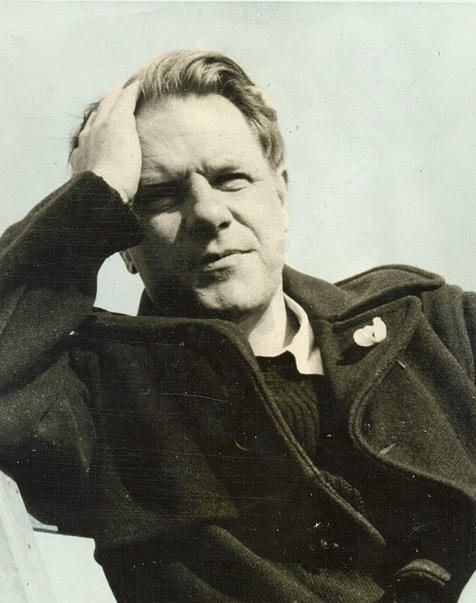
After reading Hamlet, Lawrence Durrell, then in his mid-twenties, writes to his mentor Henry Miller, detailing his thoughts on the play. Miller excitedly called the letter a “note for an essay,” and the letter was eventually published in expanded form in The New English Weekly. Durrell and Miller had begun corresponding the year before, when Durrell wrote to Miller after reading his book, The Tropic of Cancer. Miller, impressed, responded, initiating their friendship of over forty years.
[early November 1936]
*[Corfu]
Dear H.M: In a hell of a mess packing to move into town for the winter. I have just finished Hamlet, sitting among the wreckage. Let me try and tell you what I feel. Seems it’s a perfect picture of the inner struggle, done in terms of the outer one—as all great books are—at least for me. Why everyone is so puzzled by poor Hamlet is because the always try to see a relation between the external battle (the murder, Ophelia etc) and the internal one. A failure, because the inner and the outer reality move along separate plane, and only seldom meet. There’s your dialectical interplay, but through the reality always the magic is seen. Naturally people who try to equate the moods with the external events never hit the mark. There are two Hamlets. We are presented with the Prince of Denmark, and it’s only through the chinks in his armour that we can see the inner man, the worm turning in the bowels of compassion etc. But as the play goes on, the inner Hamlet, no longer Prince, grows and begins to strip his fellow characters of their masks. The great shock is to find himself alone in life—with no contact—not even with that sweet but silly little wretch Ophelia. Horatio a heart-of-oak dumbbell. Laertes a boring soldier. Polonius a blow-fly. The Queen a toad. Then, realizing that he should really turn away from these fakes to his real self, he feels the pressure of society suddenly on him. He is forced to be the Prince, however much his private Hamlet suffers. It is a marvelous picture of psychic & social disorganization in an individual and Shax was not the only one who found himself trying to write it. The tragedy of Hamlet was the tragedy of the Elizabethan Age. The age which poisoned its young men with the humanities and then showed them none. It is the tragedy of England now, but more advanced, more grey and carious than ever. But for those birds it was do or die. A lot died. Webster & Shakespeare came thro’. Marston found God, and Donne and Hall. Tourneur was starved. Southwell tortured 13 times and then burned. And out of all this muck the bright ideal of chivalry was eating their livers. They were recoiling from the real the whole time. Hamlet is a local effort. An epitome of what England’s madness means. In Lawrence you see the same thing in a new version. Idealism in the bud eating eating eating….. All the questions posed in literature since Marlowe mean the same thing.
In my opinion Tropic is the answer to them. The wheel turned right back to the pre-glacial ice age when dung was dung and angels were angels. In Tropic the borderline has been passed. Those of us who realize what it means rejoice because the whole pattern has been put back into proportion by it. This may amaze you but it’s true. And an Englishman could never have done it. Somehow you have to be a real exile to do things on that scale. But for you, I shouldn’t bother to read Hamlet except for the poetry. Its doubts and grimaces you have already solved for yourself. But by God, Shakespeare was on the point of solving it more than once. But he failed, so Hamlet failed. There was nothing left but the stagnant end, the conventional Elizabethan pogrom, and a brief but witty epitaph. Shakespeare went home and buried the guts under his cherry tree. The same question comes up all over the place, though less in Hamlet and no nearer a solution. Lear, Timon and the marvelous heart breaking Sonnets show his madness. But chained. Englishmen have always, in spite of the national anthem, been slaves. Only Chaucer, Skelton and perhaps a few others, authentic barbarians, broke away or were born free.
But no writer as great as Shax or of his age escaped. In Hamlet the biggest evidences of the inner feud are in the Ophelia bits. Society—the fact that he had a penis—forced him to consider her. But she was uncomprehending, and his inner Hamlet soon made him negligent of her. Contemptuous. Nay, he even wanted to destroy her.
The terrible irony of his ravings at the grave has never been experienced except by me. To assure himself? No. Simply because he was so far beyond anything like death, living in his own chronology, he engaged in a word-duel with her too-protesting brother. Irony beyond anything ever seen. Two minutes after, he picks himself up like a drunk and goes off with Horatio, chattering away. Ophelia is the external tragedy—SHE DOES NOT COUNT.
Well, I don’t know whether you follow this crazy idea of mine, if you don’t please say and I’ll send you the essay I’m going to write on our dear Hamlet. A fellow of infinite jest. Irony like iron. And could you please keep this note? In a little while I want to start making notes for the essay and it might help me a bit. I have not yet written anything at all about it and my ideas are a bit tangled. This would help me finally to get them clear.
I say, Hamlet must be a great play. T.S. Eliot says it’s an artistic failure’. That makes me dead certain. Eliot’s struggle is so feeble he can’t have any idea what it’s all about.
[…]
From The Durrell-Miller Letters 1935-80. New Directions Publishing: 1988.


